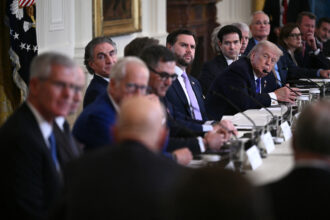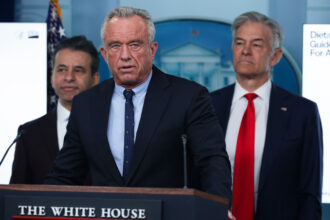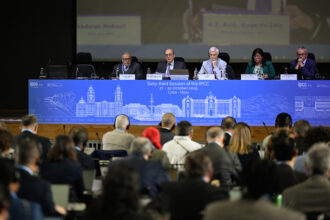The world’s biggest investors see enormous money-making potential in the fight against climate change, but they stress that they need “clear, credible long-term policies” from governments to step up their investments.
The importance of those policies are clear in the 2009 Investor Statement on the Urgent Need for a Global Agreement on Climate Change, released ahead of critical UN and G20 negotiations on climate change taking place over the next week in New York and Pittsburgh.
The statement is an unprecedented call for strong international climate action, signed by 181 pension funds, banks and other institutional investors from across the financial spectrum.
With collective assets totaling $13 trillion, they are a powerful voice of financial experts who recognize the potential for both economic growth if the world responds boldly to climate change, reinventing its energy, building and transportation systems in a low-carbon mold, and financial risk if the world fails to take action.
“It is our duty to maximize returns on investment and to manage avoidable risks to investors. Quite simply, climate change poses a significant risk to the global economy,” said New York State Comptroller Tom DiNapoli, who oversees the $116.5 billion New York State Common Retirement Fund.
The investor statement calls for a global agreement at Copenhagen that includes:
- A global emissions reduction target of 50-85% by 2050.
- Developed countries reducing emissions 80-95% by 2050, with interim targets in line with the IPCC recommendation of 25-40% and backed up by effective national action plans.
- Developing countries creating action plans that deliver measurable and verifiable emissions reductions.
- Government support for energy efficiency and low-carbon technologies.
- Measures that support the move to an effective global carbon market, including ambitious caps, fair and efficient allocation of allowances, and links between different trading schemes.
- Revisions to the Clean Development Mechanism to ensure real, permanent and verifiable emission reductions.
- Public financing mechanisms that leverage private sector finance for investment in developing countries.
- Measures to reduce deforestation.
- Support for adaptation to unavoidable climate change impacts.
The statement also notes the powerful role big investors can play in pushing corporations to respond to climate change with sustainable, climate-friendly development.
Activist shareholders are already pressuring companies to change their practices, such as stopping their use of mountaintop-mined coal or tar sands oil, and encouraging business regulators such as the SEC to require greater disclosure of climate change risk.
“Private capital is essential to achieving the transformation to a low-carbon economy and for contributing to the delivery of mitigation and adaptation measures,” the statement says. “It is therefore critical that heads of state and policymakers understand how climate change-related public policy will influence investment decisions.”
British economist Nicholas Stern, who joined investment leaders in announcing the statement, sees a major economic transition over next 20 to 30 years as the world deals with climate change, either proactively with a financial gain or reactively for its own survival.
“We are embarking on the most rapid period of technological change in economic history. This will be bigger than the railways and electricity,” Stern said.
“This is an enormous investment opportunity … provided the right kind of policies are put in place so that investors have the right incentives and the right confidence to go forward.”
The world’s governments need to produce policies that create stable market conditions, end the boom and bust cycles of renewable energy use, and discourage high-polluting technology, said Mindy Lubber, president of Ceres, one of the leaders of the investor effort. With clear market signals, a cap on carbon and a price on carbon, investment will flow.
“The private sector adjusts to real data — when the real market signals come, the financial community will react," she said.
Business leaders, including the CEOs of GE, Caterpillar, TIAA-CREF, UBS and Oracle, told President Obama much the same at a White House meeting earlier this year.
The list of signers also reflects the value of those signals. It including the treasurers of more than a dozen states, many of them already working with greenhouse gas reduction signals written into state energy efficiency and renewable electricity standards.
From California, a recognized leader in energy efficiency and environmental policy for years, the treasurer, controller and heads of the massive California Public Employees Retirement System, with assets over $190 billion, and the California Teachers Retirement System, with investments of around $120 billion, all signed the statement.
Also signing were state investment managers from the Northeastern states of Connecticut, Maine, Maryland, New Jersey, New York, Rhode Island and Vermont — all members of the Regional Greenhouse Gas Initiative carbon-trading program.
So what are the chances of strong climate action from the U.S. government and international community this year? Stern sees a “decent chance” of a clear framework emerging from Copenhagen, and Lubber and DiNapoli are hopeful that the U.S. Senate will also pass climate legislation.
“We cannot wait any longer, we have to act now,” DiNapoli said. "There is too much at stake both for the health of our planet and for the health of our investments and economies.”
See also:
Businesses Need a Clear Path to Clean Energy, CEOs Tell Obama
SEC Should Require Disclosure of Risk to Fossil Fuel Investors
Report Warns Tar Sands a Risky Bet for Investors
Energy Investors Seek Strong, Green Signal from Stimulus
Insurance CEOs Call on Industry to Get Proactive About Climate Change
Honest Accounting of Pollution’s True Costs
About This Story
Perhaps you noticed: This story, like all the news we publish, is free to read. That’s because Inside Climate News is a 501c3 nonprofit organization. We do not charge a subscription fee, lock our news behind a paywall, or clutter our website with ads. We make our news on climate and the environment freely available to you and anyone who wants it.
That’s not all. We also share our news for free with scores of other media organizations around the country. Many of them can’t afford to do environmental journalism of their own. We’ve built bureaus from coast to coast to report local stories, collaborate with local newsrooms and co-publish articles so that this vital work is shared as widely as possible.
Two of us launched ICN in 2007. Six years later we earned a Pulitzer Prize for National Reporting, and now we run the oldest and largest dedicated climate newsroom in the nation. We tell the story in all its complexity. We hold polluters accountable. We expose environmental injustice. We debunk misinformation. We scrutinize solutions and inspire action.
Donations from readers like you fund every aspect of what we do. If you don’t already, will you support our ongoing work, our reporting on the biggest crisis facing our planet, and help us reach even more readers in more places?
Please take a moment to make a tax-deductible donation. Every one of them makes a difference.
Thank you,












